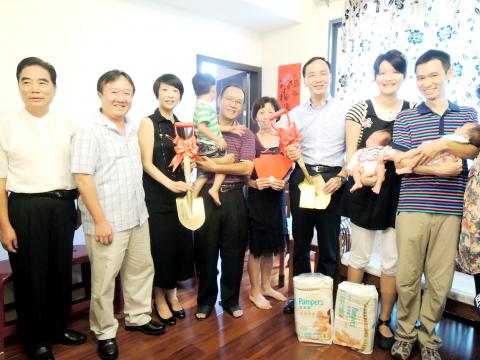A couple from New Taipei City’s (新北市) Linkou District (林口) have been celebrating the arrival of twins after seven years trying in vain to conceive, attributing their success to a ceremonial golden shovel handed out by the New Taipei City Government last year.
Chen Shih-chieh (陳世傑) said he and his wife, Hsieh Ju-yuan (謝如媛), had tried literally everything to get pregnant since they got married seven years ago, from receiving Western and traditional Chinese herbal medical treatment to performing an array of folk customs said to be able to increase a couple’s odds of conceiving a baby.
After all the methods turned out ineffectual, the couple decided to give up on natural conception and turn to artificial insemination instead, Chen said.

Photo: Kuo Yen-hui, Taipei Times
“However, in November last year, before we went to a fertility clinic, my wife heard that the city government was giving out 300 ceremonial gold shovels to married couples to wish them good luck in their quest to get pregnant,” Chen said.
Chen said his wife got up early the next morning to line up for a shovel and then followed the exact “instructions” on how to use it.
“My wife first took the golden shovel to Linkou’s Jhulinshan Kuanyin Temple (竹林山觀音寺) to pray to the Fertility Goddess for her blessing and then placed it upside down under our bed because she had always wanted a baby girl,” Chen said.
Chen said his wife got pregnant shortly afterwards and gave birth to twin girls last month. She nicknamed the babies Shuang Shuang (雙雙) and Hsi Hsi (喜喜) because shuang si (雙喜) means “double happiness” in Chinese.
Hsieh has passed the shovel to her brother, who has also been struggling to have a child for several years.
According to the city government’s Public Health Department, the 69cm shovels are made of iron and coated with gold paint, each bearing the phrase: “Increase production to serve the country, may you soon give birth to a boy” (增產報國,早生貴子) carved on the handle.
Legend has it that putting a shovel that has been used in a ground-breaking ceremony under a couple’s bed increases their chances of having a baby because the Chinese for shovel is chan zi (鏟子), which sounds exactly the same as the Chinese word for “giving birth to a son.”
“After praying to the Fertility Goddess, couples that wish to have a boy should place the shovel right side up under their bed, while those wishing to have a girl should place them upside down,” the department said.
New Taipei City Mayor Eric Chu (朱立倫) and New Taipei City Councilor Tsai Shu-chun (蔡淑君) visited the couple on Monday to congratulate them and hand over a child subsidy of NT$40,000.
Under the city’s program to boost the birthrate, women who have been registered in the city for more than 10 months are given a subsidy of NT$20,000 for each child that is born.
Chu said the city government has increased the number of golden shovels to be handed out in November to 500 to cope with the demand.
“If one shovel can help bring two babies into the world, then the city should be welcoming 1,000 newborns in no time,” he said.

Taipei has once again made it to the top 100 in Oxford Economics’ Global Cities Index 2025 report, moving up five places from last year to 60. The annual index, which was published last month, evaluated 1,000 of the most populated metropolises based on five indices — economics, human capital, quality of life, environment and governance. New York maintained its top spot this year, placing first in the economics index thanks to the strength of its vibrant financial industry and economic stability. Taipei ranked 263rd in economics, 44th in human capital, 15th in quality of life, 284th for environment and 75th in governance,

The Sports Administration yesterday demanded an apology from the national table tennis association for barring 17-year-old Yeh Yi-tian (葉伊恬) from competing in the upcoming World Table Tennis (WTT) United States Smash tournament in Las Vegas this July. The sports agency said in a statement that the Chinese Taipei Table Tennis Association (CTTTA) must explain to the public why it withdrew Yeh from the WTT tournament in Las Vegas. The sports agency said it contacted the association to express its disapproval of the decision-making process after receiving a complaint from Yeh’s coach, Chuang

Control Yuan Secretary-General Lee Chun-yi (李俊俋) tendered his resignation last night, admitting that he had misused a government vehicle, as reported by media. His resignation was immediately accepted by the Control Yuan. In a statement explaining why he had resigned, Lee apologized for using a Control Yuan vehicle to transport his dog to a pet grooming salon on May 20. The issue first came to light late last month, when TVBS News reported that Lee had instructed his driver to take the dog to the salon. The news channel broadcast photos that it said were taken by an unnamed whistle-blower, which purportedly showed the

Democratic Progressive Party caucus chief executive Rosalia Wu, front, grabs the pennant in a dragon boat race hosted by Qu Yuan Temple in the Shuanghsi River in Taipei’s Beitou District yesterday.